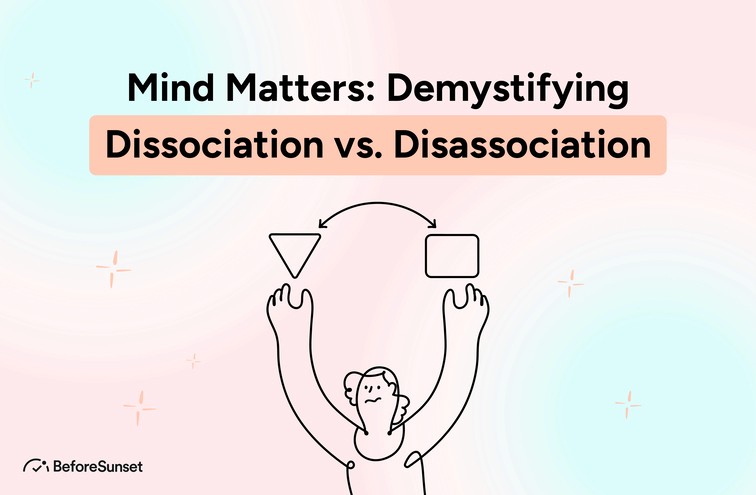Welcome to "Mind Matters: Demystifying Dissociation vs. Disassociation." In the intricate landscape of the human mind and the diverse realms of science, language, and mental health, the terms "dissociation" and "disassociation" often emerge with subtle but significant distinctions.
This blog delves into the depths of these terms, unraveling their meanings, applications, and the impact they wield on our understanding of psychological experiences and chemical processes.
You May Also Be Interested In:
Juggling Act: Mastering Divided Attention in a Distracted World
How Does Being A Multitasker Affect Your Work?
What is Toxic Productivity? And 5 Ways to Overcome it

Difference in Symptoms Of Dissociation And Disassociation
It's important to clarify that "disassociation" is often considered a less common variant spelling of "dissociation," and the terms are often used interchangeably. In the context of mental health and psychology, the symptoms associated with dissociation are generally discussed, as "disassociation" is less commonly used in this domain.
Symptoms of Dissociation:
Dissociation, in the psychological sense, involves a disruption or disconnection in a person's thoughts, memories, identity, or consciousness. The symptoms can vary in intensity, and individuals may experience:
Depersonalization: Feeling detached from one's own body, thoughts, or emotions. It can create a sense of watching oneself from the outside.
Derealization: Perceiving the external environment as unreal or unfamiliar. This can include a sense of distortion in the perception of surroundings.
Amnesia: Gaps in memory, ranging from minor forgetfulness to more severe memory loss, often related to stressful or traumatic events.
Identity Disturbances: In severe cases, individuals may experience disruptions in their sense of self or even exhibit multiple distinct identities (as seen in Dissociative Identity Disorder).
Flashbacks: Re-experiencing traumatic events as if they were happening in the present moment.
Identity Confusion: Feeling uncertain about one's own identity, including aspects of self and personal history.
Chemical Disassociation (Chemistry):
In the context of chemistry, "disassociation" is used to describe the separation of a molecule into its constituent ions when dissolved in a solvent. This process is fundamental to understanding chemical reactions. Symptoms, per se, are not applicable in this context, as it is a term used to explain the behavior of substances at a molecular level rather than describing psychological experiences.
Which Is More Distressing?
Both dissociation and disassociation can be distressing, but the degree of distress depends on the context in which each term is used.
1. Dissociation (Psychological Context):
Distress Level: High
Reason: In the realm of psychology, dissociation is often associated with a range of mental health conditions, including dissociative disorders. In these cases, individuals may experience significant distress due to disruptions in their thoughts, emotions, memories, or identity.
Severe dissociative symptoms, such as amnesia, depersonalization, or identity disturbances, can lead to challenges in daily functioning and overall well-being. The distress is often linked to past trauma or overwhelming stressors.
2. Disassociation (Chemical Context):
Distress Level: Typically Low
Reason: In the field of chemistry, disassociation refers to the separation of molecules into their constituent ions. While this process is essential to understanding chemical reactions, it doesn't carry the emotional or psychological weight that dissociation does.
The use of "disassociation" in chemistry is more of a technical term to describe a specific chemical phenomenon rather than a subjective experience involving distress.

Difference in Negative Impact Of Dissociation And Disassociation
Negative Impact of Dissociation (Psychological Context):
Dissociation in the psychological context carries a significant negative impact, often associated with mental health disorders and trauma. Individuals experiencing dissociation may face psychological distress manifested through symptoms like depersonalization, derealization, amnesia, and identity disturbances.
These symptoms can lead to impaired functioning in daily life, affecting memory recall, decision-making, and the ability to navigate interpersonal relationships. The negative impact of dissociation is intricately linked to emotional and psychological well-being, with severe cases resulting in the fragmentation of one's sense of self.
The trauma associations often tied to dissociation further compound the negative impact, creating challenges in the path to recovery and overall life satisfaction.
Negative Impact of Disassociation (Chemical Context):
Conversely, in the realm of chemistry, disassociation is a term with a more technical and specific connotation. It refers to the separation of molecules into their constituent ions in solution, a fundamental concept in understanding chemical reactions.
The negative impact of disassociation in this context is limited and revolves around the consequences of chemical reactions rather than emotional or psychological distress. For instance, in the disassociation of an acid, the negative impact might be reflected in changes to pH levels, affecting the properties of the solution.
The impact is essentially scientific and devoid of the personal and emotional dimensions associated with psychological dissociation.
Which Is More Common?
"Dissociation" is more common and widely used than "disassociation," especially in psychological and clinical contexts. "Dissociation" is the term generally employed to describe the psychological process of disconnecting from one's thoughts, feelings, memories, or identity. It is a recognized concept in psychology, particularly in the context of dissociative disorders and trauma-related responses.
In contrast, "disassociation" is less commonly used and is often considered a variant spelling of "dissociation." While both terms essentially convey a sense of separation or disconnection, "dissociation" has become the more accepted and prevalent term, particularly in academic and clinical literature.
The preference for "dissociation" over "disassociation" may vary in different fields and regions, but in the psychological and mental health context, "dissociation" is the term you are more likely to encounter.

Differences in Self-Care Tips For Dissociation And Disassociation
Grounding Techniques: Practice grounding exercises to reconnect with the present moment. This might include focusing on your senses, such as feeling the texture of an object or paying attention to the sounds around you.
Deep Breathing: Engage in deep breathing exercises to help regulate your nervous system. Slow, intentional breaths can bring a sense of calm and centering.
Create a Safe Space: Identify and create a physical or mental space where you feel safe and secure. This can serve as a refuge during episodes of dissociation.
Establish Routine: Stick to a regular routine as much as possible. Predictability and structure can provide a sense of stability.
Mindfulness and Meditation: Practice mindfulness or meditation to enhance awareness and stay connected to the present moment. Apps and guided sessions can be helpful.
Seek Professional Support: If dissociation is causing significant distress, consider seeking the guidance of a mental health professional. Therapy especially approaches like grounding techniques, cognitive-behavioral therapy (CBT), or dialectical behavior therapy (DBT), can be beneficial.
How Can BeforeSunset AI Help You?
BeforeSunset AI is a valuable ally for individuals experiencing dissociation by providing structure and support in their daily lives. Task management features, such as to-do lists, break down larger responsibilities into more manageable steps, reducing the potential for overwhelm during dissociative episodes.


